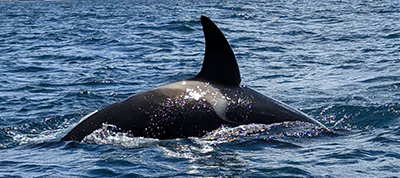A few times a year, Iberian Orcas, commonly known as Killer Whales, come close to the coast of Sesimbra in pursuit of bluefin tuna on their migratory cycle, their main food, towards the north of the Peninsula.
They are a unique and distinct population of orcas (Orcinus orca) in the Atlantic, present only along the west and north coasts of the Iberian Peninsula, in the Strait of Gibraltar and in the Gulf of Cadiz.
They are famous for their intelligence and complex social structures, with their own dialect, diet and social behaviors.
This population of orcas is now very small, with the latest estimates suggesting fewer than 40 individuals in total, divided into smaller groups (subpopulations) that move along the coast of the Iberian peninsula and with very few breeding individuals.
Conservation efforts are being made to protect this very vulnerable species, seeking to ensure sustainable tuna populations, more marine protected areas to reduce human impact, with several multidisciplinary research and conservation groups dedicated to its study.
The Iberian orca is currently classified on the IUCN Red List as a "critically endangered species", just one classification away from extincted in the wild.
This status as a critically endangered species is the result of several factors, among the most aggravating being the scarcity of its main prey, bluefin tuna, which has been severely depleted by overfishing. This scarcity of food forces orcas to spend more energy hunting, affecting their health and reproductive success.
Disturbances caused by increased maritime traffic and entanglement in fishing gear also endanger orcas, especially calves and juveniles, and disrupt their social groups, which are crucial to their survival and reproduction.
Protecting these unique cetaceans requires a concerted effort by governments, conservationists and awareness-raising among coastal communities to ensure that future generations can also witness populations of orcas thriving in their natural habitat, the Iberian seas.
The critical situation of these orcas serves as a warning of the tenuous balance between marine ecosystems and human activity.
Fight for their conservation is crucial.
In the images: Orca Gladis Albarracín-GA , hunting tuna in Sesimbra, 19.06.2024
Credits: Bolhas Tours


